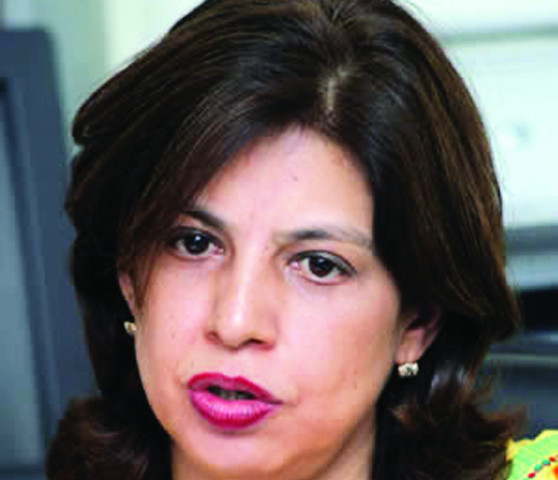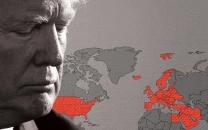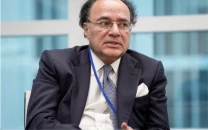Pre-operation: Pakistan hopes Afghanistan will not allow militants refuge in its territory
FO spokesperson says Afghanistan is investigating murder of FC soldiers. Questions status of Pakistani in Indian jail.

The bottom-line is that when Syria’s own position has evolved, when Syria is a part of the process, we don’t see any harm in endorsing it, Foreign Office spokesperson Tasnim Aslam PHOTO: FILE
The foreign office spokesperson reiterated during the weekly briefing on Thursday that it was hoped Afghanistan would ensure its soil is not used against Pakistan.
Asked if the Afghan authorities had been asked to seal the border in the event of an operation in the tribal belt, the spokesperson responded that Pakistan had emphasised with its western neighbours that the policy that our soil should not be used against them and their soil should not be used against us and that Pakistan expects Afghanistan to act in line with its international obligations.
“I would recall for you the recent Trilateral Summit in Ankara in which Pakistan and Afghanistan reiterated their commitment that they would not allow their soil to be used against the national interest of each other.
“Obviously, if there is military action on ground, our expectation from Afghanistan, in accordance with its international obligations and our bilateral understandings, would be that Afghan government would not allow any terrorist refuge on its territory.”
Asked if the matter of foreign fighters had been taken up with countries of their origin, the spokesperson said that the terror also has regional dimensions and that they are engaged with the Central Asian Republics.
“If an Uzbek is killed in North Waziristan, the question is whether he flew there or did he traverse a lot of territory to get there. Terrorism also has regional dimensions.
“We are engaged with the Central Asian Republics and there is awareness in these countries about this problem.”
She added that the responsibility falls on those who are at the helm of affairs in Afghanistan or who control that territory. “The responsibility for not allowing one’s soil to be used against other is not unilateral. It involves all states. There is a responsibility on those who are managing the security situation in Afghanistan to control it.”
The spokesperson added that the recently Pakistan’s secretary interior visited Afghanistan and had very useful meetings and a number of steps were considered and we do hope that subsequent meetings to finalise these steps are held.
On the dead FC soldiers
Pakistan has provided information to Afghanistan regarding the 23 FC personnel who were killed allegedly on Afghan territory and that Afghan authorities have been asked to investigate the matter.
“They have informed us that they are in the process of investigation of the incident and they would get back to us on that.”
Sanctions prevent Iran-Pakistan pipeline
Responding to a question on the stalled multi-billion Iran-Pakistan gas pipeline, the spokesperson said that there were many elements of that agreement, some which were subject to sanctions including the provision of some credit line.
“Iran informed us some time back that because of the sanctions they would not be able to provide that.”
She added that since sanctions are in place, no other company or consortium has evinced interest in getting involved in this project. “That’s why we have said that timeline would be to be looked at again. We hope that the process which is underway in three plus three would lead to successful settling of the Iranian nuclear issue and sanctions would be removed as a result. Then we can proceed ahead.”
An alternative route would be if some companies could be attracted that would want to build this project.
“At the movement the situation is that because of the sanctions, Iran has not been able to meet its obligations and because of sanctions no company is getting involved.”
Pakistanis asked to leave UAE
Asked again this week on the status of some Pakistanis who have been asked to leave the United Arab Emirates (UAE), the spokesperson said that the office had been informed by the Pakistan Embassy in UAE that some Pakistanis had indeed been asked to leave the UAE.
“They are not in very large numbers, yet Pakistanis, who are residing legally, if they are asked to leave without any reason, it is not understandable.”
The spokesperson added that Pakistani diplomats were in touch with the UAE foreign office and were trying to resolve this issue.
“Our Ministry of Foreign Affairs is also in touch with the Embassy of the UAE here. We will do whatever we can to help and protect the interests of our citizens wherever they are.”
Providing arms for Syria
Reiterating that Pakistan was not planning to supply arms that could contribute to the ongoing Syrian conflict, the spokesperson shared the policy guidelines that Pakistan has for sale of arms.
“We do not supply arms to entities. The guidelines are:
i. Adherence to the principles and purposes of the United Nations charter.
ii. Recognition of the right of all states to protect their security.
iii. Reaffirmation of the right of all states to self-defence.
iv. Observance of relevant national laws and regulations on export of conventional arms.
v. Consistence with National Security and Foreign Policy Objectives.
I may add here that regime change from outside by any means is something that Pakistan has persistently and very strongly opposed.
vi. Compliance with the UN Security Council arms and embargoes. That is if any countries is under an arms embargo, we do not do an arms deal with them.
vii. Sub-Regional and Regional peace, security and stability consideration.
In addition to that, we also have what is known as “end users” certificate which ensures that our weapons are not resold or provided to a third country. The text of this certificate reads
“The goods will neither be used for any purpose associated with chemical biological or nuclear weapons or missiles capable of delivering such weapons, nor will they be resold if we know of suspect that they are intended or likely to be used for such purpose. It is also confirmed that the goods will not be transferred to any third country without the prior agreement of the Government of Pakistan”.
On support for the Geneva-I communique, the spokesperson said that Pakistan’s policy is very clear. “First, respect for the territorial integrity and sovereignty of Syria; respect for human rights. We don’t want bloodshed in Syria whoever may be responsible for it.”
Pakistan welcomed Syria’s accession to the Chemical Weapons Convention (CWC) and its agreement to destroy chemical weapons. “We have also taken note of the humanitarian situation there and we would like to see people of Syria getting humanitarian supplies.”
The bottom-line is that when Syria’s own position has evolved, when Syria is a part of the process, we don’t see any harm in endorsing it.
Cross-LoC CBMs
On the subject of an extra ordinary session of the Joint Working Group on Cross LoC CBM in February, the spokesperson said that tentative dates are set for the first week of March.
Asked about Siachen, the spokesperson said that Pakistan and India have an agreed mechanism for discussing, with a view to resolving, all the outstanding issues and disputes between the two countries - the Composite Dialogue Process.
She said that the two countries had come very close to resolving this longstanding issue in 1989 but India backed out of that agreement. Since then there were other possibilities that have been discussed.
Unfortunately, “there is no Composite Dialogue at the moment. We would hope that whenever this dialogue process resumes, we would look at these issues and try to find a solution.”
Pakistani in Indian jail
Asked about the Pakistani prisoner who allegedly committed suicide in an Indian jail, thespokesperson said that Shaukat Ali had died in India an unnatural death.
“We were told that he committed suicide. There were also reports that he was not a mentally balanced person but that begs the question that if he was not mentally stable what was he doing in the Jail in the first place? How can you keep a mentally challenged person in Jail?”
She added that while there were some discrepancies, Pakistan believes there currently are close to 500 prisoners languishing in Indian jails.



















COMMENTS
Comments are moderated and generally will be posted if they are on-topic and not abusive.
For more information, please see our Comments FAQ